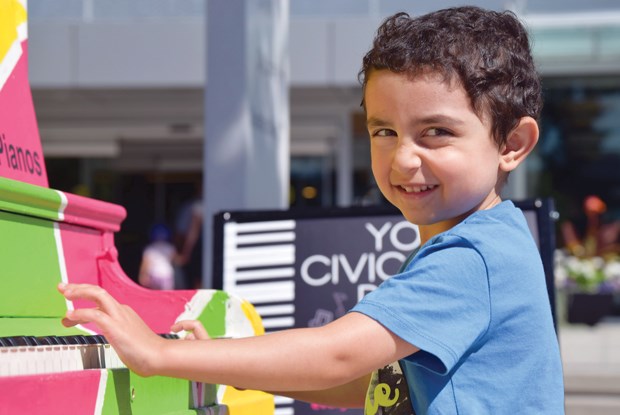With a little help from his mom, three-and-a-half-year-old Soren sits up on the piano bench and starts banging the keys.
At first the sounds are discordant. But as he continues to play, the notes become more melodic, not quite a song, but something resembling at least the effort to create one. Sometimes he uses just one hand and one finger to play and sometimes he uses both.
Soren has never had a piano lesson. He doesn’t play any instruments, but his mom says she will consider lessons when he is five. He’s a bit young yet.
But he is already a fan of music.
As he sits, focused on the keys in front of him for longer than one would think a three-year-old would be, it is clear that what Soren lacks in technical skill he certainly makes up for in enthusiasm.
Just off to the side, Jeremy Jacobs waits patiently for his turn to play. He is enjoying watching Soren experiment with music, and remarks how great it is to have a piano outside in the plaza for anyone to try.
The free musical instrument is part of the Pianos on the Street program. It has been at the North Vancouver Civic Plaza since June and will stay until the end of the summer.
Jacobs has been playing piano since he was four-and-a-half, but says he was making music earlier than that just by making sounds.
“I always wanted to be a violinist when I was little, but I was better at this,” he notes. He also plays guitar and drums.
“I think I was born to play that thing,” he adds with a laugh, gesturing to the piano, but says that he considers himself more of a composer.
It is a short walk to the plaza from his home on 17th Street, and Jacobs has played this piano often. He also likes to watch others play and chat with onlookers.
Now an addictions counsellor, there was a time when Jacobs performed as a musician in front of audiences and sometimes with a band, but he stopped because he got tired of the scene. Unfortunately, he notes, his music became isolated then, and music is meant to be shared.
“It is key,” he says when asked about the importance of the social element of art. That’s why he loves playing in the plaza: it allows him to share his music again.
People love art because it tends to “tell it like we see it,” unlike in real life, he adds. Art is more honest.
Soon Soren shuffles off the bench and Jacobs hops on and starts to play.
He has discussed his ideas about kids and music (“Giving kids music when they’re really young increases their language potential”); how music is based on physics (“Sound happens over time and it relates to certain frequencies”); and his preference for acoustic instruments over digital. He has opinions about the current music industry and how melody can be more powerful than lyrics. But when he starts to play, he is quiet and focused.
A mother and daughter sit nearby listening, and a construction worker rushing through the plaza also stops and listens. In just a short interval of time, two artists, one trained and one just starting out, have used this piano to connect with a small audience of strangers and share an interest in music, a love perhaps, or just a curiosity.
Contact Rosalind Duane at [email protected].



